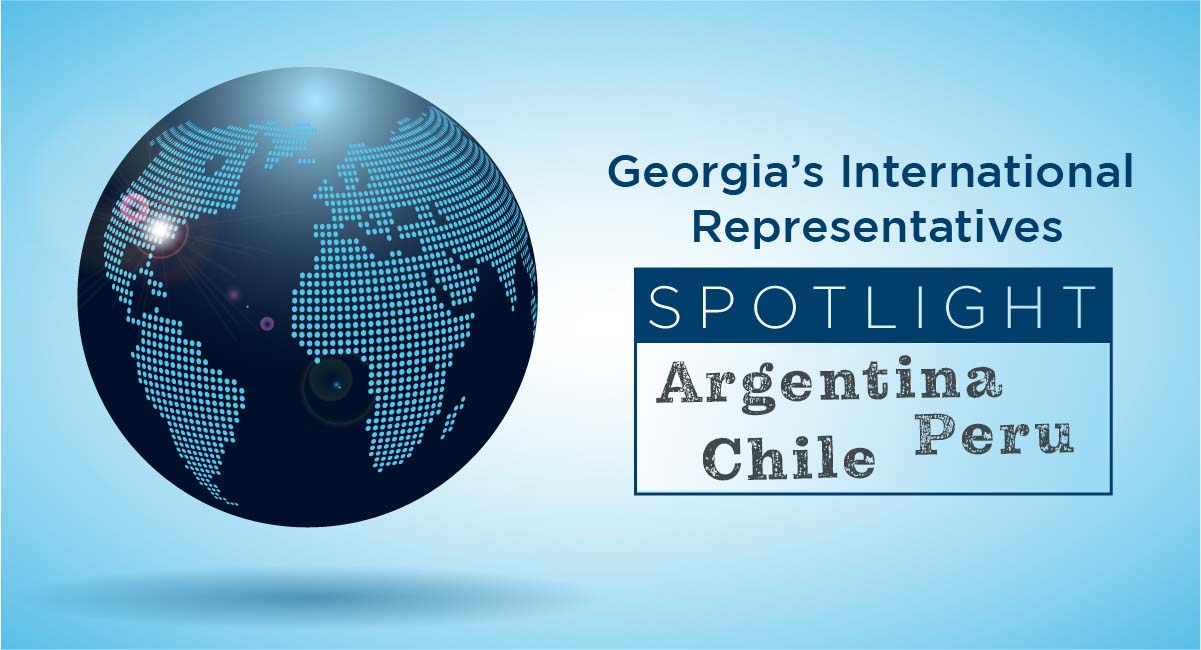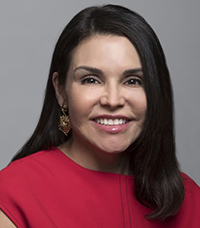International Representative Spotlight: Chile, Peru, and Argentina

International Representative Spotlight: Chile, Peru, and Argentina

Interviewee Name and Title:
Veronica Medina, Managing Director
The office in Chile covers three markets: Chile, Peru, and Argentina.
Where is the office located: The main office is based in Santiago, Chile with an office in Lima, Peru. The team is also able to provide export assistance in Argentina.
Who are the team members: The full-time staff members are Barbara Freitas and myself in Chile; Ximena Portillo in Peru.
How did you enter the world of exporting/trade and how long have you been working in this field?
Veronica: I have been in this industry for almost 30 years, and for 21 of those years, I’ve been based in Chile, working in the South American market. Prior to this, I was based in Denver, Colorado with the international trade office, then in London, working in international trade for the State of Colorado.
What typical services do you provide for Georgia exporters interested in your markets?
V: We do a lot of market research, which determines how our markets look at a particular product. This would include industry background, import totals, country of origin, and competitor analysis. We also provide Business Partner Identification (BPI), distributor-end client reports, showing the distributors that Georgia companies should be working with. At times, we also research regulatory requirements for specific products or services from Georgia.
What do you consider the biggest challenge(s) to exporters interested in your markets? What about the greatest opportunity?
V: I think the biggest challenge would be the openness of the Chile and Peru markets. Chile has the most Free Trade Agreements (FTAs) signed in the world, and Peru has many as well. Both of these countries have FTAs with the United States, so in terms of competition, you will probably find competitors in our markets for that Georgia product or service. Companies should think about what value added services would differentiate themselves from their competitors in these markets. For Argentina, the challenge is a little different. It has more to do with the bureaucracy of that country. Argentina has a tendency for its trade policies to be more protectionist, so it might be harder to get into a country like Argentina.
Another challenge for all of these markets is that you have to be consistently following up with the local players and the companies we are putting you in contact with. The follow up has to be active, whether it is by telephone, email, or WhatsApp - a technology we use a lot for business in these markets.
The greatest opportunity would be that U.S. products are perceived to be high quality. There is also a perception that a businessperson from the U.S. is serious and trustworthy when they are doing business. This is definitely an opportunity Georgia companies should take advantage of, since our markets are so open and we are trading with everyone.
Other opportunities are that the United States is our main partner for trade and investment, and doing business in Chile and Peru allows companies to reach out to the Pacific Alliance bloc, which includes Colombia and Mexico. This increases the size of the market a company can pursue versus just coming into Chile, which is a relatively small country with a population of 18 million, or Peru with 32 million. It broadens the scope of business.
What is the trade relationship between the U.S. and your markets like?
V: Chile’s trade agreement with the U.S. dates back to 2004, and to 2009 with Peru, so these are long standing trade agreements. These countries are used to having a commercial relationship with the United States. With that relationship, there is also an established political relationship, so it becomes much easier in terms of negotiating aspects of trade agreements. With Argentina, a trade and investment agreement framework was signed in 2016. As mentioned before, the United States is the main trading and investment partner for Chile, Peru, and Argentina.
Are there any trends, be it in policy, culture, or consumption habits that exporters should be aware of when considering these markets?
V: Over the last year and a half, the pandemic has changed a lot. Our habits, business models; there have been big transformations in our markets. Healthy foods were strong coming into the pandemic, but it grew exponentially and developed that opportunity in our markets during the pandemic. Organic foods, pharmaceuticals, and technology for remote work and eLearning have grown as well. For example, Chile has opened its schools, but Peru’s students are still remote, so there are opportunities for eLearning in that sense. Things have changed in the corporate world as well. Some businesses are keeping the hybrid model going forward. You see trends in anything that has to do with the digitalization of companies and e-commerce has gone into a boom. Anything that has to do with medical devices and health technologies we see having great opportunities as well.
Another shift that we have seen during the pandemic is having supply chains closer to the United States. We see Latin America as a good alternative to other countries in the supply chains that might be further from the United States.
What advice do you have for companies looking to start exporting to Chile, Peru, or Argentina?
V: The first thing we tell Georgia companies is that you have to assign a representative, distributor, or an agent in our market if you want your business to be sustainable. It’s also important for those companies to provide support to those local counterparts, whether that’s with marketing materials, training, that will be available to them if there are issues that come up in their promotion.
It is also important to be competitive, and have a clear value-added proposition focused on quality, price, and service. All of this should be clearly established when you come into our market. Georgia companies should be aware that our markets are used to trading internationally. Obviously, the U.S. has an advantage in terms of being a main trading partner, but we also have strong competition for U.S. products here. Therefore, you have to have those plans clear when you come into the market.
Localization of the product or service, and not putting Chile, Peru, and Argentina into one bag is important as well. We might speak the same language, but the business cultures within these three markets are different.
Doing your due diligence, having that legal support is important if you are going to be signing contracts and negotiating with decision makers. That is where we come in, by connecting Georgia companies to local players. That will be more efficient for the Georgia company, and also cuts down on that sale cycle.
Tell us about a memorable time when you were able to help a Georgia company avoid or overcome a major pitfall in your markets. What was the situation and what do you want other companies to learn from this?
V: Last year, we worked with a company that does blockchain for the health sector. For something like this, we had to start by identifying whom the key players were in blockchain and health. This industry isn’t as developed in Chile as it is in other sectors. It required learning and finding different associations, or government and private institutions, and doing a market report to see if there was an opportunity in this sector. That was something we really needed to work on with the company and the local players. Ultimately, the company was able to identify a local ambassador to continue promotion of blockchain in the health sector. Just a few months ago, they hosted a webinar with their Chilean and U.S. partners, and a new connection in Dubai. The key message here is that sometimes you have to go a bit further and gather a lot of market information before trying to identify a local representative. There is a lot of research that we have to do in order to find out if there is a market for a Georgia product or service.
What has been your biggest export achievement?
V: We delivered a Business Partner Identification report in Chile and Peru for a company we work with called AdEdge. The person we worked with in Georgia said they received an order from a Chilean company we introduced them to, and it was the fastest sale that she had experienced in her work with the state.
What made the biggest impression on you when you visited Georgia?
V: Some of my main takeaways when I visited Georgia were the number of SMEs involved in international trade. I knew that Georgia was a very important state for trade in the United States, but once you get down to the local company level, you can see the amount of SMEs that are involved in international trade, but are also willing to trade to markets like ours, and not just to Canada or Mexico.
When we would travel around the state and meet with different companies, I was surprised to see how technologically advanced companies were across all industries. I was very fortunate to visit the Port of Savannah during one of my last trips, and saw how key Savannah is to trade in the U.S. and the world. Many goods from Chile and Peru go through the Port of Savannah. It’s different from looking at the numbers and statistics through your laptop, as opposed to actually going there and seeing it in person and the people behind it. It gives it a completely new feel and outlook.
What do you enjoy most about representing Georgia in Chile, Peru, and Argentina?
V: The Southern hospitality impressed me when I was traveling. Some of the nicest people I know are from Georgia, and the people are very open and nice. There are nice people anywhere in the world, but Georgia really stands out. I meet and work with different business people from different industries, continually setting up meetings with Georgia companies and local companies, and see the different styles of doing business and strategies between executives. My team has learned a lot from working with Georgia companies.
What do you think would most surprise Georgians to learn of the Chilean, Peruvian, and Argentinian markets?
V: The most frequent comments we hear from our Georgia clients are about the openness of the market. They didn’t realize how open our markets are, that you can find multinational and foreign companies here, and how competitive the market might be because we are open to international trade. Something else that might surprise Georgia clients is the business culture. You might think that in Chile, Peru, and Argentina, they all speak Spanish, so you can use the same strategies to do business, but really, you can’t. Each country has different business cultures. The last thing I would say is how advanced our markets are, and sometimes companies aren’t expecting that. For example, the mining industry here is probably one of the most advanced in the world.
###
Are you a Georgia business looking for help growing your international sales? Find out how Georgia’s International Trade Team can help at www.Georgia.org/Trade.
